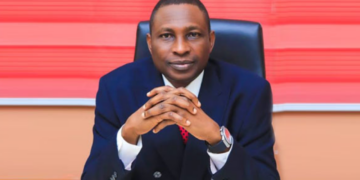One of the issues at the centre of the current strike by Resident Doctors in the country is the acute shortage of medical practitioners across all levels of Nigeria’s health sector. The situation is made worse by the ‘Japa’ syndrome among doctors and nurses.
According to the Nigerian Medical Association, a minimum of 50 doctors leave Nigeria every week to work abroad.
This ongoing brain drain in the country’s healthcare system has had an unquantifiable adverse effect on health service delivery. We cannot afford to continue in this manner.
In the considered opinion of this Newspaper, the administration of President Bola Tinubu must take a bold step to address the situation.
Undoubtedly, doctors play a critical role in the healthcare system, and their absence can have severe consequences for patients seeking medical attention. It is a danger that should be avoided in the health sector.
In Nigeria, doctors’ strikes have become a recurrent issue, causing significant disruptions in healthcare delivery. The danger of doctors’ strikes in Nigeria cannot be overemphasized, and urgent steps need to be taken to address this problem.
One of the most significant dangers of doctors’ strikes is the loss of lives that could have been saved. When doctors go on strike, patients who require medical attention are left to suffer without adequate care. This can result in preventable deaths and exacerbate health conditions that could have been treated if doctors were available. The most vulnerable members of society, such as pregnant women and children, are particularly at risk during doctors’ strikes.
Another danger of doctors’ strikes is the potential for long-term damage to the healthcare system. When doctors go on strike, patients may lose trust in the system, and many may resort to seeking medical care from unqualified and unlicensed practitioners.
This can lead to a decline in the quality of healthcare services and an increase in health-related complications. Additionally, the healthcare system may lose experienced physicians who choose to leave the country for better working conditions.
Doctors’ strikes can also have a negative impact on the economy. When doctors go on strike, businesses may suffer as workers take time off to care for sick family members. The healthcare sector generates significant revenue for the economy, and disruptions in this sector can have a ripple effect on other industries.
To address the danger of doctors’ strikes in Nigeria, urgent action needs to be taken by the government and other stakeholders.
The healthcare system in Nigeria is plagued by several challenges, including inadequate funding, poor infrastructure, and a shortage of healthcare workers. Nigeria’s healthcare sector is primarily funded by the government, and the budget allocation for healthcare is meager, leading to a lack of investment in critical areas.
We strongly advocate that governments at all levels must make substantial investments in the health sector. Back in 2001, several countries, including Nigeria, committed to a 15% budget pledge to enhance resources and improve healthcare throughout Africa.
Regrettably, over the past two decades, the average budget allocation to the health sector in Nigeria has been around 4.7%.
Consequently, healthcare facilities remain poorly equipped, and essential drugs and medical supplies are frequently insufficient.
Addressing this issue is crucial to ensure better healthcare services for the people.
The state of healthcare infrastructure in Nigeria is also a cause for concern. Many healthcare facilities in Nigeria lack basic amenities, such as electricity, running water, and adequate sanitation facilities.
The lack of electricity is particularly problematic, as it hinders the delivery of quality healthcare services, especially in rural areas. Many healthcare facilities also lack adequate medical equipment and machinery, making it challenging to provide accurate diagnoses and treatment.
The shortage of healthcare workers is particularly acute in rural areas, where many health workers are reluctant to work due to the lack of basic amenities and poor working conditions.
Again, there is a significant shortage of healthcare workers in Nigeria. According to the World Health Organisation (WHO), Nigeria has a ratio of one doctor to every 5,000 patients, which is significantly below the WHO recommended standard of one doctor to 600 patients.
In our view, the government should prioritise the welfare of healthcare workers by improving their working conditions and remuneration. This will help to retain experienced doctors and reduce the likelihood of future strikes.
Secondly, the government should engage in dialogue with healthcare workers to address their grievances and find lasting solutions to the challenges facing the healthcare sector.
Furthermore, the government should invest more in the healthcare sector to improve infrastructure and equipment, and ensure that patients receive the best possible care.
In view of the foregoing, we call on the government to prioritise the healthcare sector and increase budget allocations for healthcare.
Importantly, there is a need to invest in critical areas such as medical equipment and machinery, and the recruitment and retention of healthcare workers.
Ultimately, improving Nigeria’s healthcare infrastructure will help to reduce preventable deaths, improve the quality of life for many Nigerians, and boost the country’s overall development.





